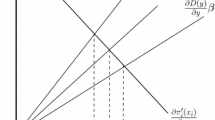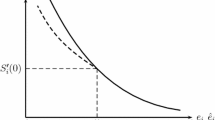Abstract
In contrast with what we perceive is the conventional wisdom about setting a second-best emissions tax to control a uniformly mixed pollutant under uncertainty, we demonstrate that setting a uniform tax equal to expected marginal damage is not generally efficient under incomplete information about firms’ abatement costs and damages from pollution. We show that efficient taxes will deviate from expected marginal damage if marginal damage is increasing and there is uncertainty about the slopes of the marginal abatement costs of regulated firms. Moreover, tax rates will vary across firms if a regulator can use observable firm-level characteristics to gain some information about how the firms’ marginal abatement costs vary.
Similar content being viewed by others
References
Baliga S, Maskin E (2003) Mechanism design for the environment, chapter 7. In: Maller KG, Vincent JR (eds) Handbook of environmental economics. vol 3. Amsterdam, Elsevier Science B.V.
Baranzini A, Goldemberg J, Speck S (2000) A future for carbon taxes. Ecological Economics 32: 395–412
Baumol WJ, Oates WE (1988) The theory of environmental policy. Cambridge University Press, Cambridge
Bye B, Nyborg K (2003) Are differentiated carbon taxes inefficient? A general equilibrium analysis. Energy Journal 24: 95–112
Dasgupta P, Hammond P, Maskin E (1980) On imperfect information and optimal pollution control. Rev Econ Stud 47(5): 857–860
Hoel M, Karp L (2001) Taxes and quotas for a stock pollutant with multiplicative uncertainty. J Public Econ 82(1): 91–114
Hoel M, Karp L (2002) Taxes versus quotas for a stock pollutant. Resour Energy Econ 24(4): 367–384
Kwerel E (1977) To tell the truth: imperfect information and optimal pollution control. Rev Econ Stud 44(3): 595–601
Laffont JJ (1977) More on prices vs. quantities. Rev Econ Stud 44(1): 177–182
Malcomson J (1978) Prices vs. quantities: a critical note on the use of approximations. Rev Econ Stud 45(1): 203–207
Moledina A, Coggins J, Polasky S, Costello C (2003) Dynamic environmental policy with strategic firms: Prices versus quantities. J Environ Econ Manage 45(2S): 356–376
Newell R, Pizer W (2003) Regulating stock externalities under uncertainty. J Environ Econ Manage 45(2, Supplement 1): 416–432
Quirion P (2004) Prices versus quantities in a second-best setting. Environ Resour Econ 29(3): 337–359
Roberts M, Spence M (1976) Effluent charges and licenses under uncertainty. J Public Econ 5: 193–208
Stavins R (1996) Correlated uncertainty and policy instrument choice. J Environ Econ Manage 30: 218–232
Weitzman M (1974) Prices vs. quantities. Rev Econ Stud 41(4): 477–491
Weitzman M (1978) Reply to “Prices vs. quantities: a critical note on the use of approximations” by James M Malcomson. Rev Econ Stud 45(1): 209–210
Author information
Authors and Affiliations
Corresponding author
Rights and permissions
About this article
Cite this article
Chávez, C., Stranlund, J.K. A Note on Emissions Taxes and Incomplete Information. Environ Resource Econ 44, 137–144 (2009). https://doi.org/10.1007/s10640-008-9257-1
Received:
Accepted:
Published:
Issue Date:
DOI: https://doi.org/10.1007/s10640-008-9257-1




